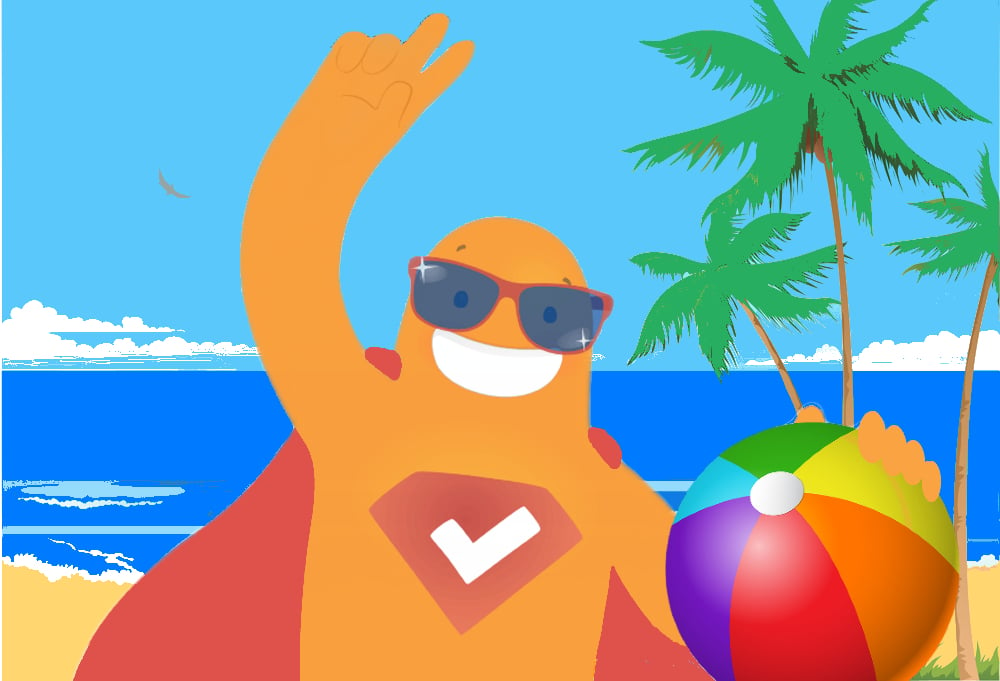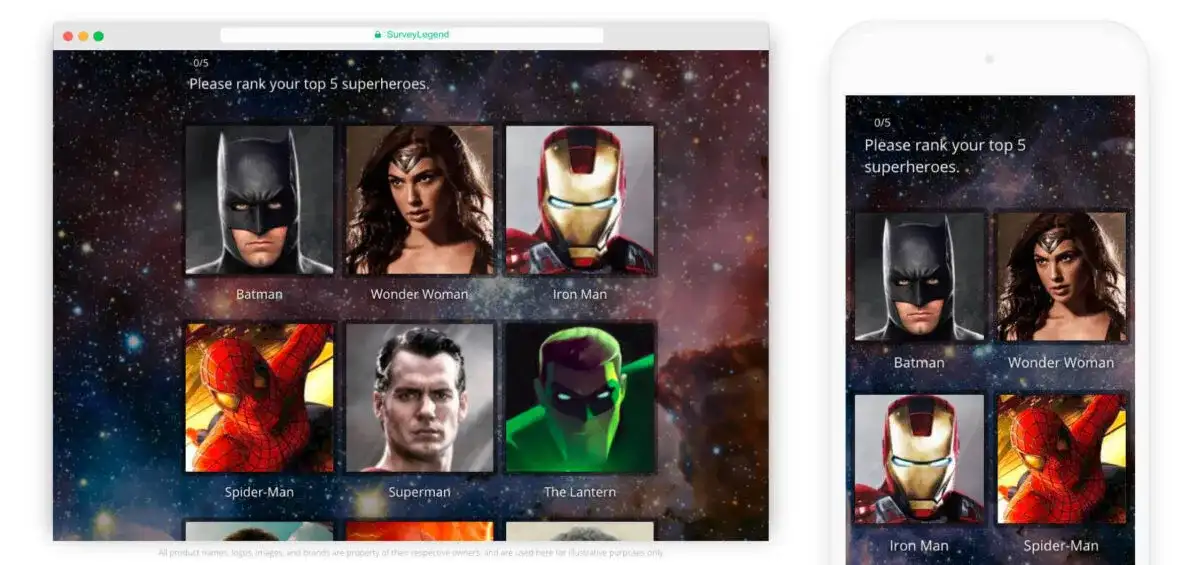Ah, summertime, that hot but happy season when the sun stretches its rays like a lazy dog waking from a nap. Vacations are planned, the kids are tasting freedom from school, beaches and boats are packed, and ice cream trucks spread joy with every jingle. Can you picture it? Now, how to go about surveying people about it? With SurveyLegend, it’s easy.
Create Your FREE Summertime Survey, Poll, or Quiz Now!
Reasons To Conduct A Summertime Survey
The reason behind conducting a summertime survey may vary. Overall though, surveying during the summer offers a unique opportunity to engage with respondents during a season characterized by increased social activities, leisure time, and interest in seasonal survey topics. So what might you want to survey about?
Many summer surveys focus on seasonal activities and preferences. They may focus on travel, outdoor recreation, grilling, gardening, or beach vacations. People who enjoy these activities may be more inclined to participate in surveys that align with their seasonal interests making summertime the right time to survey about these activities. Of course, a lot of events are held during the summer too. Event organizers will want to conduct surveys to get feedback on the events so that they know what works and what they can improve upon for future summer events. Here are a few key summertime events that you may want to survey about (or, send your survey crew to to conduct on-the-fly in-person interviews).
Key Summertime Events
- Music Festivals/Outdoor Concerts
- Sports Events/Tournaments
- Cultural Festivals/Food Events
- Outdoor Markets/Carnivals & Fairs
- Beach & Pool Parties/Bonfires
- Fireworks Displays (Check out our Independence Day Survey blog)
- Outdoor Film Screenings/Stage Productions
- Boat Parades/Water Sports Events
- Neighborhood Potlucks/Block Parties
- Outdoor Excursions/Summer Camp
During the summer, many people engage with their community. For example block parties, as mentioned above. So, some summer surveys may be conducted by local governments, organizations, or community groups to gather feedback on summer events, festivals, or community initiatives. Residents may participate in these surveys to voice their opinions and contribute to community decision-making.
With the rise of social media and online communities, people may come across summertime surveys through platforms like Facebook, Twitter, or community forums. Sharing surveys with friends or followers can also contribute to social engagement and encourage participation. Read more about “How To Use Social Media Surveys.” Lastly, many people are interested in contributing to research studies or academic surveys to advance knowledge in various fields. Summertime surveys may offer opportunities for individuals to participate in research projects while enjoying their summer break.
7 Summertime Survey Considerations
Whether you should conduct surveys during the summer depends on several factors, including the goals of your survey, the target audience, and the nature of the questions being asked. Here are some considerations to help you decide whether summer is an appropriate time to conduct your survey:
1. Relevance to Summer
Make sure your summer survey questions are relevant to the season, such as travel, outdoor activities, or summer events, conducting the survey during the summer can yield more accurate and meaningful responses. People are more likely to engage with surveys that apply to them in the moment, than in the past or future.
2. Availability of Respondents
During the summer, people may have more free time due to vacations, school breaks, or flexible work schedules. This increased availability can make it easier to reach potential respondents and encourage participation in your survey.
3. Potential for Non-Response Bias
It’s important to consider whether the timing of your survey could introduce non-response bias in the survey. For example, if your survey targets parents of school-aged children and is conducted during the summer when many families are on vacation, you may not capture the perspectives of all relevant respondents.
4. Competition for Attention
As we noted, many people have more flexibility during the summer. However, because of work or school breaks, you may be competing with their vacations, outdoor activities, and social events. Be mindful of the timing of your survey and consider whether respondents are likely to be receptive to participating during the summer months.
5. Incentives and Rewards
Offering incentives or rewards for survey participation can help boost response rates, regardless of the time of year (although during the summer, with the added expenses of travel and so on, people may be more budget conscious and willing to spend time with a survey if they are rewarded). Remember to consider on your end, as well, if you have the resources to offer incentives and whether summer-themed rewards (such as gift cards for summer activities or travel) would be appealing to your target audience. Read more about the “Pros and Cons of Survey Incentives.”
6. Data Collection Methods
Consider the most effective methods for collecting survey responses during the summer. For example, online surveys may be more convenient for respondents who are traveling or spending time outdoors, while in-person surveys may be less effective if people are away from home. In-person surveys may work well if you’re targeting random people at events, while again a mail-in survey may not work well if people are traveling and not picking up their mail.
7. Opportunity to Influence
Surveys provide individuals with an opportunity to express their opinions, preferences, and concerns on various topics. People may participate in seasonal surveys to have their voices heard and potentially influence decisions or policies related to summertime activities, products, or services.
Create Your FREE Summertime Survey, Poll, or Quiz Now!
Summertime Survey Examples
Here are a few summer survey examples created using SurveyLegend. This first one, which might be conducted by event organizers or community organizations, asks people how they plan to spend their summer. This is also a great type of summer survey for engaging with people over social media. It uses SurveyLegend’s popular image questions for visual engagement. A fun, beachy backdrop was chosen for this survey to get people in the mood for summertime fun.
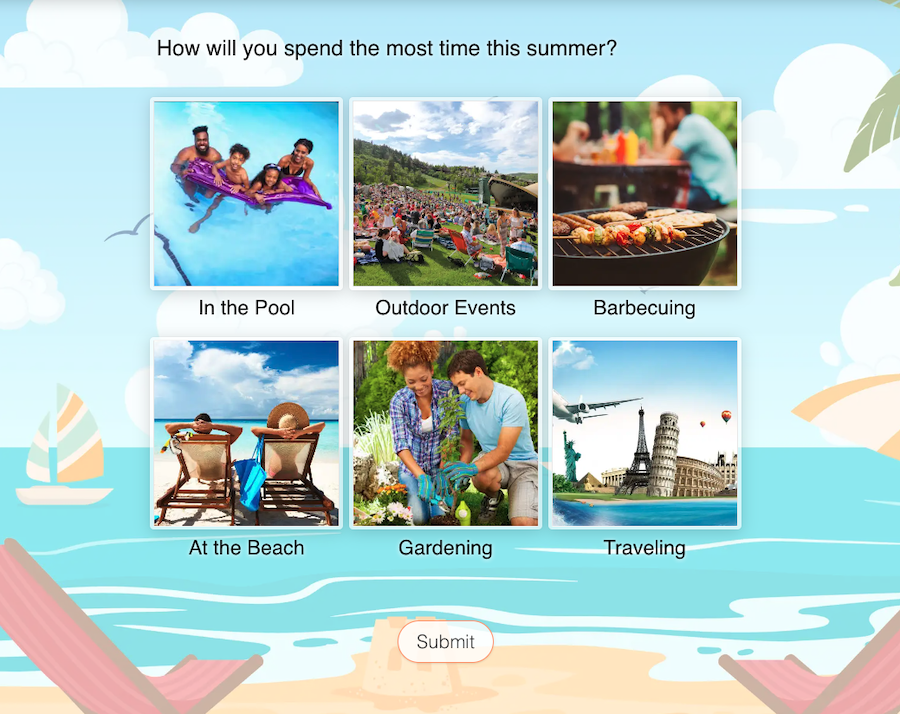
An event organizer will likely conduct this second summertime survey example. Rather than use picture questions, it employs a variety of types of survey questions, including star ratings, thumbs, and an opinion scale. This is also ideal for restaurants and other venues gauging people’s overall experiences. Another plus? SurveyLegend lets you upload your own backdrop, so you could use a photo from the actual concert, or your restaurant, and so on.
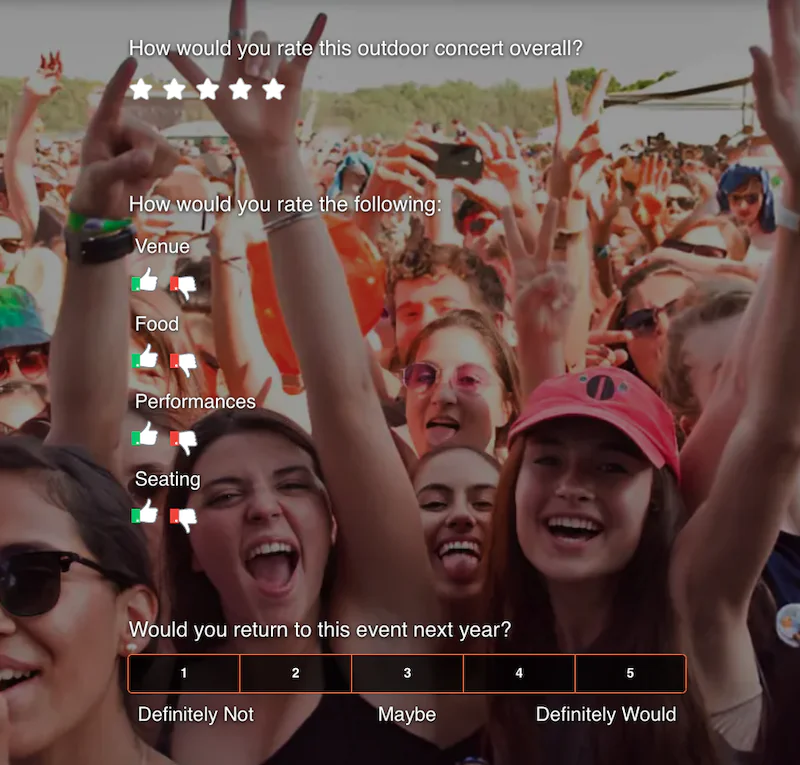
Lastly, summertime trivia can be a fun way to engage with survey participants. This is especially popular, again, on social media. If the survey is fun and people enjoy taking it, they’ll forward or share it with friends, quickly broadening the reach of your survey. Before you know it, your summertime trivia survey has gone viral! Read more about “How To Create a Viral Quiz.”
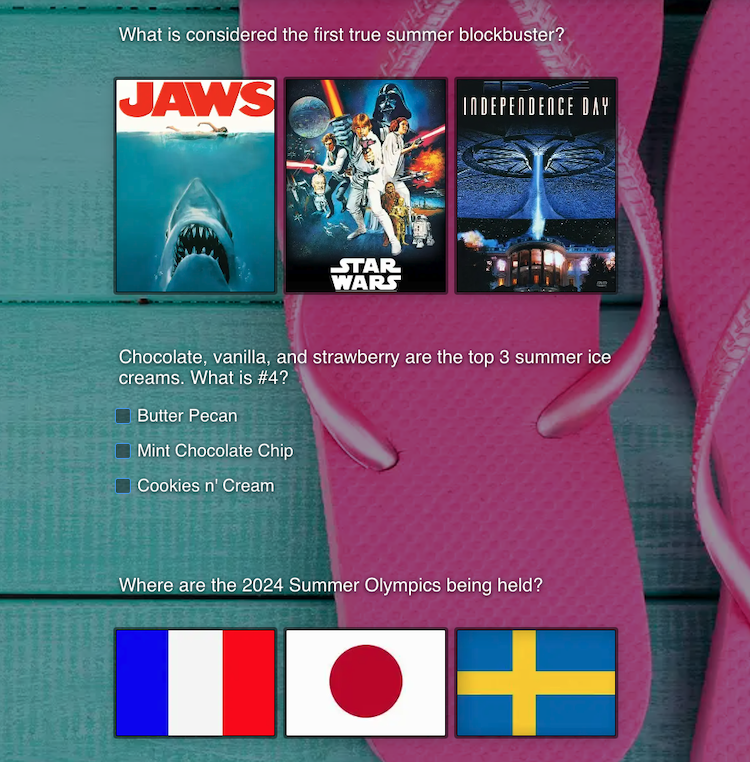
Conclusion
Summer surveys play a crucial role in capturing insights and feedback from individuals during a season marked by unique activities, preferences, and behaviors. These surveys provide valuable opportunities for organizations, businesses, and researchers to understand how people engage with summertime events, travel, leisure activities, and consumer trends.
By conducting surveys during the summer, organizations can gather timely data that reflects seasonal fluctuations and preferences, enabling them to make informed decisions, tailor marketing strategies, and improve products or services to better meet the needs and desires of their target audience. They can also help identify emerging trends, measure customer satisfaction, and uncover areas for growth or innovation within specific industries, ultimately contributing to more effective planning and resource allocation year-round.
Ready to create your summertime survey? SurveyLegend has you covered. With a track record of delivering high-quality survey solutions and generating reliable insights for clients, we are the winner of the G2 High Performer Badge 2024. That’s not all – our surveys offer a wide variety of question types, high levels of security, page and skip logic, and render beautifully on any device. Start today for free!
Do you often conduct seasonal surveys? Do you get better response rates at different times of the year? Let us know in the comments.
Create Your FREE Summertime Survey, Poll, or Quiz Now!
Frequently Asked Questions
What is the most popular time of the year to survey people?
Although there are many advocates for summer surveys, typically spring and fall are considered ideal times for conducting surveys because they typically coincide with periods of relative stability and routine in people’s lives. These seasons are less affected by major holidays, vacations, or weather-related disruptions, making it easier to reach potential respondents and obtain reliable data.
Is summer a good time to survey people?
Summer can be a good time to survey people. During the summer, people may have more flexible schedules, allowing them time to complete the survey. People also tend to be in a vacation mindset during the summer, and as such, they may be more open-minded and receptive to new experiences, ideas, or products. This vacation mindset can translate to increased willingness to participate in surveys and provide thoughtful feedback.
Summer is also a time when many students are out of school, and young adults have more free time. If your survey targets a younger demographic, such as college students or young professionals, summer can be an opportune time to reach them when they are more available and accessible. Finally, summer events like outdoor festivals or community gatherings can be a great time to ask face-to-face summer survey questions.
